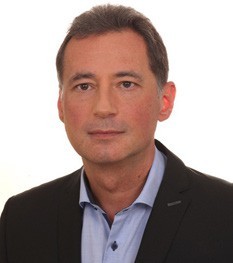CARDIOVASCULAR & METABOLIC
Addressing inequalities in access to medicines in a post-COVID world: the challenge of cardiovascular disease
Dan Ionescu from Daiichi Sankyo Europe talks to Pharmafile about the company’s role in improving access to cardiovascular treatments and preventing cardiovascular disease
What are the major health system challenges that you would like to tackle?
My biggest priority is to partner with health systems and payers to improve access to Daiichi Sankyo medicines, so people living with cardiovascular disease (CVD) have a better chance of living healthier lives. In my role, I am committed to ensuring that those who could potentially benefit from our treatments, are able to do so.
When I started my career as a neurologist, I was working in the National Stroke Institute in Bucharest and, every day, I saw first-hand the difficulties that access barriers have on treating and managing patients. That experience had quite an impact on me as a young doctor, and it motivates me to this day.
Since I started working in the pharmaceutical industry, I have worked to help efforts to address the unmet clinical needs of many patients with CVD. The disease burden is significant: in 2020 alone, 60 million people were living with the disease in Europe.1
Our understanding of the needs of CVD patients is growing, particularly for those with complex medical needs or who are at high-risk for cardiovascular events. We see this reflected in the expanding scope covered within European guidelines, which are now advising that more powerful and effective therapies are needed to manage certain patient groups.2,3 We know, however, that these come at a cost to the healthcare systems where generic medicines can be seen to be more financially favourable. 4 This is not a small challenge to overcome, and it requires a collective, collaborative approach between system partners to deliver improved outcomes for patients.

How does Daiichi Sankyo support discussions around medicine access in CVD?
Given the increasingly difficult economic situation we’re facing in Europe, which has been worsened by the COVID-19 pandemic, I feel it has become even more important to ensure that people have the opportunity to get the treatments that might help them the most.
I think some payer bodies perceive CVD as a low health priority and, in an effort to restrict budgets, are faced with difficult decisions about which therapy areas to prioritise. As CVD is Europe’s leading cause of death, I would argue that it requires appropriate prioritisation by health systems, payers and policy makers alike.1Especially since we know that 80% of premature deaths due to heart attacks and stroke are preventable. 5
Now more than ever, it is important that payer bodies recognise the health and budgetary advantages of improving access to novel therapies for CVD. There is great value in adopting a longer-term focus in all health-economic conversations. At Daiichi Sankyo we are keen to work with payer bodies to demonstrate efficiencies and savings by investing in medicines that can help prevent costly CVD events later on.
Such preventative measures and early therapeutic interventions can have significant benefits for healthcare systems in the long term.2 Key to this is making use of our extensive data and working with payer bodies to identify which patient populations respond best to these treatments. From my experience, we truly see the positive impact of this approach in key markets across Europe.
Why is this an important time to focus on improving access to cardiovascular health?
CVD has an enormous societal and economic impact, costing healthcare systems in Europe €210bn a year.3,6Given the fast-growing and ageing population, combined with late-stage CVD diagnoses during the COVID-19 pandemic, patient numbers and the financial implications of CVD are only going to rise over the coming years. 7,8,9
As if that was not enough, the pandemic has had an even larger impact on CVD than some other conditions.9 An Economist Intelligencereport we commissioned found that an infection with COVID-19 can actually induce myocardial injury, arrhythmia, acute coronary syndrome and venous thromboembolism. 9In addition, the findings showed that people with CVD who are infected with COVID-19 are far more likely to experience severe symptoms of that infection, or even lose their life to it. 9
While we can’t predict the evolving needs of CVD patients affected by COVID-19 in the long term, we do know that its lasting impact is going to put further strain on healthcare systems. We can expect more people to be living with a higher risk for cardiovascular events and more patients with advanced stages of CVD – that is why more effective treatments with longterm effects will play an important role in managing this situation.9
What is the role that Daiichi Sankyo Europe and the wider industry play in helping to lessen the impact of CVD in Europe?
Given the vast scale of CVD in Europe, the opportunity to help people is enormous. When a treatment becomes reimbursed and thus widely accessible, it could potentially have an impact for hundreds of thousands of patients, and their families and loved ones, who are affected by the disease.1 That is why we shouldn’t stop driving awareness about CVD, its prevention and risk factors across Europe, and work with relevant stakeholders to bring new treatments to patients who so urgently need them.
I’m convinced that what we are doing is making a real difference in people’s lives – and this is what motivates me in my role. That being said, addressing the impact of CVD in Europe goes beyond the provision of medicines. The pharmaceutical industry can play a key role in supporting holistic care and advancing scientific understanding of CVD. At Daiichi Sankyo in Europe we are truly passionate about this aspect of care. Through our medical studies, but also broader initiatives such as the Economist Impactreport, we intend to advance and share knowledge about the scale and impact of CVD that can help inspire the future of care. 9 As we’ve seen in the wake of the pandemic, this is so important, now more than ever.
November 2022 DSC/22/0174
Disclaimer: This content has been commissioned by Daiichi Sankyo Europe and has been reviewed for compliance with the ABPI Code of Practice.
References:

Dan Ionescu is Vice- President, Head of Value and Access, Speciality Medicines at Daiichi Sankyo Europe